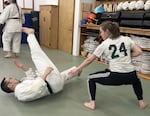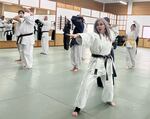
The Pacific Martial Arts Conference hosted 10 short classes, which spanned disciplines from around the world.
Nathan Wilk / KLCC
Oregon’s martial arts community is still rebuilding after the pandemic. One sign of a comeback: For the first time in four years, students and teachers gathered for a conference last week in Eugene.
The students practiced their spinning back kicks, took turns throwing their partners to the ground, and sparred in slow-motion with wooden sticks.
Some people showed up in uniform — white gis and brightly colored belts. Others arrived in T-shirts and sweatpants.
This is the Pacific Martial Arts Conference, or PacMAC. It was held Jan. 20 at Best Martial Arts Institute in Eugene.
Instructors from Oregon and Washington state came together to share about their styles, which ranged from Wing Chun kung fu to medieval Italian knife combat.
Alan Best founded the event in 2007. He said it’s a chance for martial artists to break out of their insular communities and find common ground.
“When we first started the conference, the thing that blew people away was how similar we are,” said Best. “People think that their art is the only one that does that particular kind of practice. And then they realize, oh, everybody else does this, too.”
Best said this month’s gathering drew over 60 people, despite an ice storm that hit the region just days before. Brazilian jiu-jitsu instructor Padme Grace said she traveled four hours from Long Beach, Washington, to attend.
“I’m looking for little nuggets of something good that I can pass along to my school,” said Grace. “So I take a lot of notes.”
In bare feet, participants stand ready for one of the day’s short lessons. Elida Stewart of Eugene’s Family Karate Center leads them through a kata, or a choreographed sequence of attacks.
Stewart has had a martial arts studio, or dojo, in Lane County for over three decades. She said at this event, she’s found camaraderie and friendship.
“Some of these people I’ve known for 20-plus years, and I haven’t seen them since 2020,” said Stewart. “So to get together is immensely valuable.”

Elida Stewart leads her class.
Nathan Wilk / KLCC
Signs of hope after pandemic challenges
The conference comes in the wake of the pandemic, which instructors say left a lasting impact on martial arts, both locally and nationally. Best said many schools couldn’t pay their rent during lockdowns and had to shut down permanently.
“That’s just so tragic,” said Stewart. “Will we ever truly recover?”
Stewart said dojos aren’t just for self defense, but building confidence and resistance to adversity.
“Kids at some point don’t want to listen to their parents, but they never don’t want to listen to their sensei,” she said. “And so it’s a really awesome way to inspire and help the youth go and have character, and have honor, and integrity, and all the things we want them to have.”
Grace said a dojo’s community is larger than the building itself.
“If there’s something that’s going on in somebody’s life, a lot of times they’re divorced or have grandparents that are taking care of their kids, we lend a helping hand wherever we can,” said Grace. “And we are a village.”
For the schools that remain, instructors say they’ve seen signs of recovery, and some even report a boom in attendance in recent years.
With this conference, Best said he hopes to encourage the trade of ideas and teaching practices. He said in previous years, instructors have been able to form partnerships and host each other as guest speakers.
“Fortunately, martial arts is such a solid part of our American culture now that I think we’re pretty safe with martial arts being around forever,” he said. It’s just a matter of how it evolves and honestly, things like PacMAC are right there helping us evolve maybe a little faster than it normally would.”
For those curious about Eugene’s martial arts community, Stewart said there’s no time like the present.
“‘I’ve always wanted to do that.’ I hear that a lot,” she said. “And I think that the only way you can get it off the bucket list into reality is by taking the first step, which is to show up the first day.”
Organizers plan to host the Pacific Martial Arts Conference again later this year.